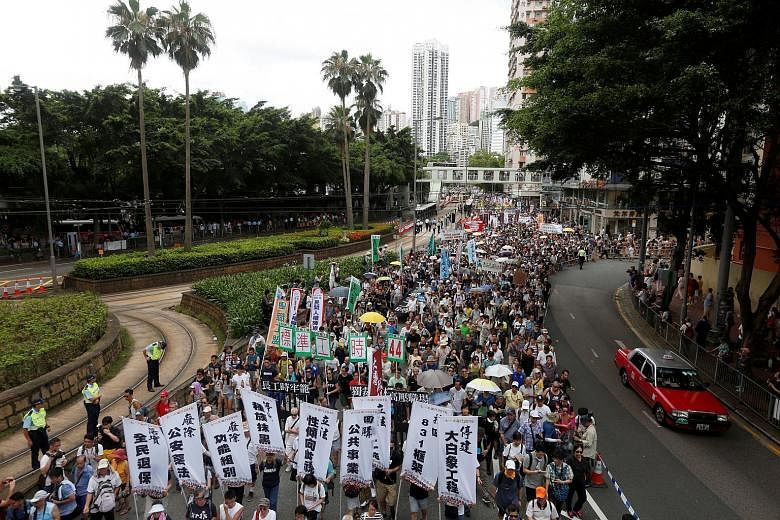There was a palpable sense of urgency among the thousands who took part in the annual July 1 march in the scorching heat yesterday, chanting slogans demanding the resignation of Hong Kong Chief Executive Leung Chun Ying.
It was an important march - their last chance to show and voice their unhappiness - before Legislative Council (Legco) elections are held in September and a new chief executive for Hong Kong is chosen in March next year.
Protesters whom The Straits Times spoke to said they decided to take part in the march as they felt that there has been an erosion of their freedoms after the city came under Mr Leung's watch.
Retiree Angela Lau, 63, said Mr Leung lacked sincerity in communicating with Hong Kongers and cared only "about carrying out Beijing's instructions".
While organisers estimated that about 110,000 people turned out for the more than two-hour march from Victoria Park to Admiralty, where the government headquarters are located, Hong Kong police said there were only 19,300 people.
The size of the turnout aside, analysts said the march to mark the anniversary of Hong Kong's return to China in 1997 was more than just an annual affair. Hong Kongers want Beijing to know of their dissatisfaction with Mr Leung, they said.
And the turnout yesterday would give the central government in Beijing a sense of how the upcoming Legco elections might pan out.
The yearly march, which began in 1998, saw the largest turnout in 2003 when close to half a million people protested against the controversial national security legislation, Article 23.
Last year, it attracted only 48,000 people, with analysts attributing the low turnout to protest fatigue after the Occupy sit-ins.
Analyst Willy Lam, who watched the march for about an hour, told The Straits Times: "There's a palpable sense of passion among the demonstrators. It seems that the organisers were able to galvanise quite a cross-section of the Hong Kong public."
He said the missing Causeway Bay booksellers episode has also sparked public outrage over what many see as the Chinese authorities taking extralegal action in a breach of the "one country, two systems" framework, which allows more liberties in Hong Kong than in China.
Last month, one of the booksellers, Mr Lam Wing Kee, 61, returned to Hong Kong and gave a startling account of his eight-month detention in the mainland and forced TV confessions.
Mr Lam was invited to lead the march with Mr Ching Cheong and Mr Lau Shan Ching - both of whom had been imprisoned in the mainland - but pulled out just hours before the march started.
Democratic Party lawmaker Albert Ho later told the media that Mr Lam pulled out as he felt his personal safety was threatened.
Mr Ching, 67, a former senior journalist with The Straits Times, said Mr Lam's withdrawal showed that Hong Kongers are "no longer free from fear".


